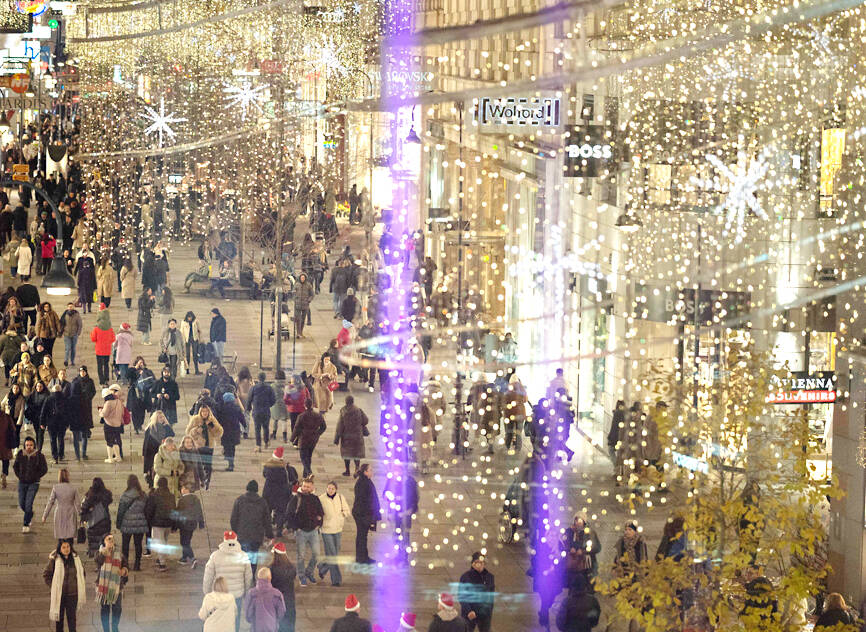Vienna would splash the cash on lighting up its famed Christmas markets to bring festive cheer to struggling retailers.
Chandeliers, glittering stars and sparkling red globes are among the designs illuminating 31 Viennese streets since Friday, with the capital boosting spending on its end-of-year light displays as Austria’s economy flounders.
“It’s just beautiful. It makes the city a bit more beautiful as a whole,” said Kateryna Baranovska, a 23-year-old student.

Photo: AFP
With local businesses increasingly unable to fork out the sums needed to keep the Christmas lights on, Vienna and its economic chamber would cover 75 percent instead of 50 percent of this year’s costs, or about 700,000 euros (US$737,921) for the lighting alone.
The small Alpine nation’s economic outlook has been gloomy since mid-2022, particularly as it is exposed to the difficulties of neighboring Germany, its main trading partner.
“We want to have a beautifully lit city and it is becoming increasingly difficult for entrepreneurs to cover these costs,” said Dieter Steup, a representative of the Vienna economic chamber.
“It is very important because the pre-Christmas period is a really important time for retailers,” he said, adding that people enjoyed shopping more under the Christmas lights.
Stored in a large warehouse on Vienna’s outskirts, workers began putting up the massive Christmas light motifs weeks before the on switch was flicked.
In an effort to lessen the impact on the climate, Vienna introduced LED lights in recent years, while the electricity needed to keep the displays twinkling from this month until January comes from renewable sources.
That energy is roughly equivalent to what a 14-apartment building uses in a year.
“The costs are actually relatively low for what you get in return, namely a good ambiance and a great atmosphere for shopping,” Steup added.
Activist group Greenpeace also said consumer behavior, including the buying of unneeded gifts, was a greater contributor to the Christmas season’s carbon footprint, with lights “hardly significant.”
In a 2022 survey, 64 percent of Austrians said the festive light displays created “a pleasant, Christmassy atmosphere” for them.
In 2022, when energy costs shot up because of Russia’s invasion of Ukraine, the Christmas lights were turned off two hours earlier to save electricity.
Since last year, the displays have again sparkled bright until midnight.

When an apartment comes up for rent in Germany’s big cities, hundreds of prospective tenants often queue down the street to view it, but the acute shortage of affordable housing is getting scant attention ahead of today’s snap general election. “Housing is one of the main problems for people, but nobody talks about it, nobody takes it seriously,” said Andreas Ibel, president of Build Europe, an association representing housing developers. Migration and the sluggish economy top the list of voters’ concerns, but analysts say housing policy fails to break through as returns on investment take time to register, making the

‘SILVER LINING’: Although the news caused TSMC to fall on the local market, an analyst said that as tariffs are not set to go into effect until April, there is still time for negotiations US President Donald Trump on Tuesday said that he would likely impose tariffs on semiconductor, automobile and pharmaceutical imports of about 25 percent, with an announcement coming as soon as April 2 in a move that would represent a dramatic widening of the US leader’s trade war. “I probably will tell you that on April 2, but it’ll be in the neighborhood of 25 percent,” Trump told reporters at his Mar-a-Lago club when asked about his plan for auto tariffs. Asked about similar levies on pharmaceutical drugs and semiconductors, the president said that “it’ll be 25 percent and higher, and it’ll

CHIP BOOM: Revenue for the semiconductor industry is set to reach US$1 trillion by 2032, opening up opportunities for the chip pacakging and testing company, it said ASE Technology Holding Co (日月光投控), the world’s largest provider of outsourced semiconductor assembly and test (OSAT) services, yesterday launched a new advanced manufacturing facility in Penang, Malaysia, aiming to meet growing demand for emerging technologies such as generative artificial intelligence (AI) applications. The US$300 million facility is a critical step in expanding ASE’s global footprint, offering an alternative for customers from the US, Europe, Japan, South Korea and China to assemble and test chips outside of Taiwan amid efforts to diversify supply chains. The plant, the company’s fifth in Malaysia, is part of a strategic expansion plan that would more than triple

Taiwanese artificial intelligence (AI) server makers are expected to make major investments in Texas in May after US President Donald Trump’s first 100 days in office and amid his rising tariff threats, Taiwan Electrical and Electronic Manufacturers’ Association (TEEMA, 台灣電子電機公會) chairman Richard Lee (李詩欽) said yesterday. The association led a delegation of seven AI server manufacturers to Washington, as well as the US states of California, Texas and New Mexico, to discuss land and tax issues, as Taiwanese firms speed up their production plans in the US with many of them seeing Texas as their top option for investment, Lee said. The